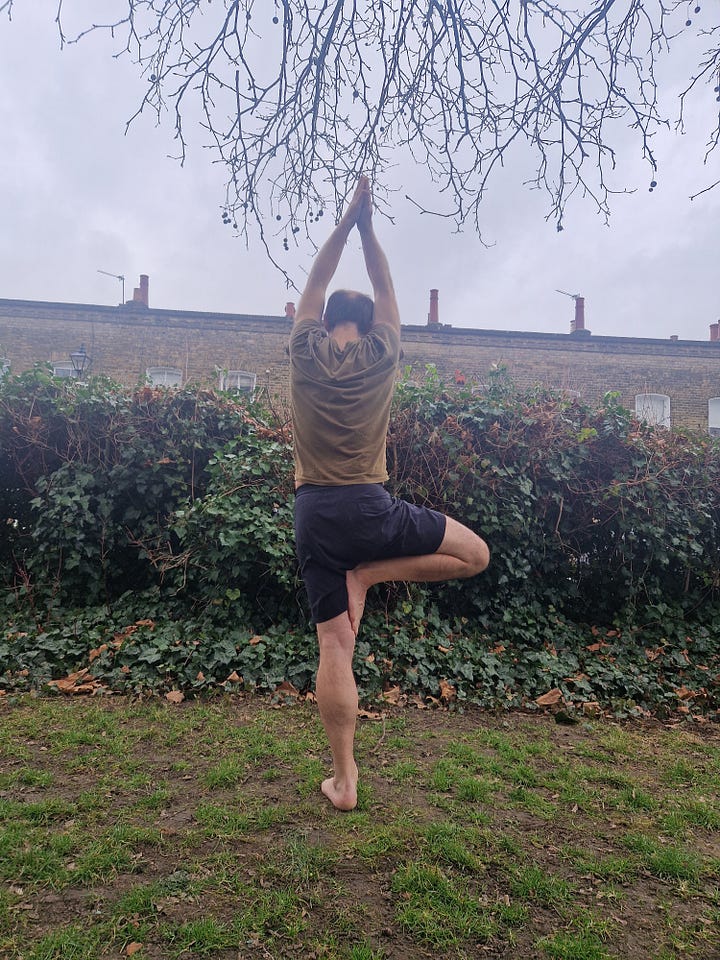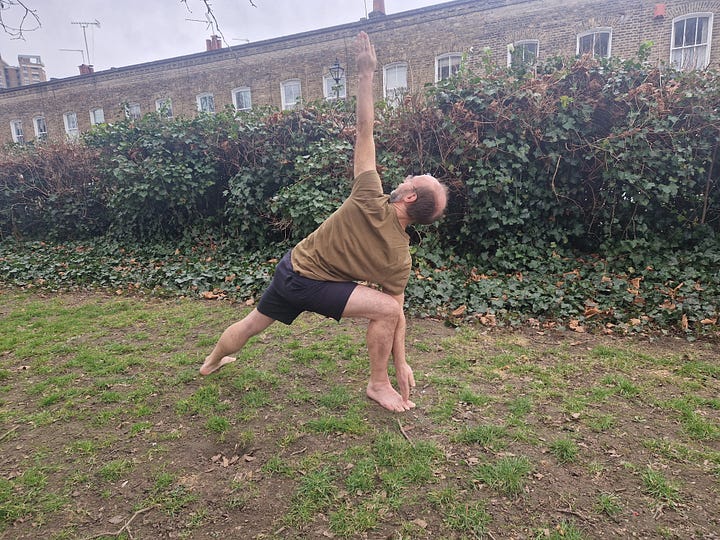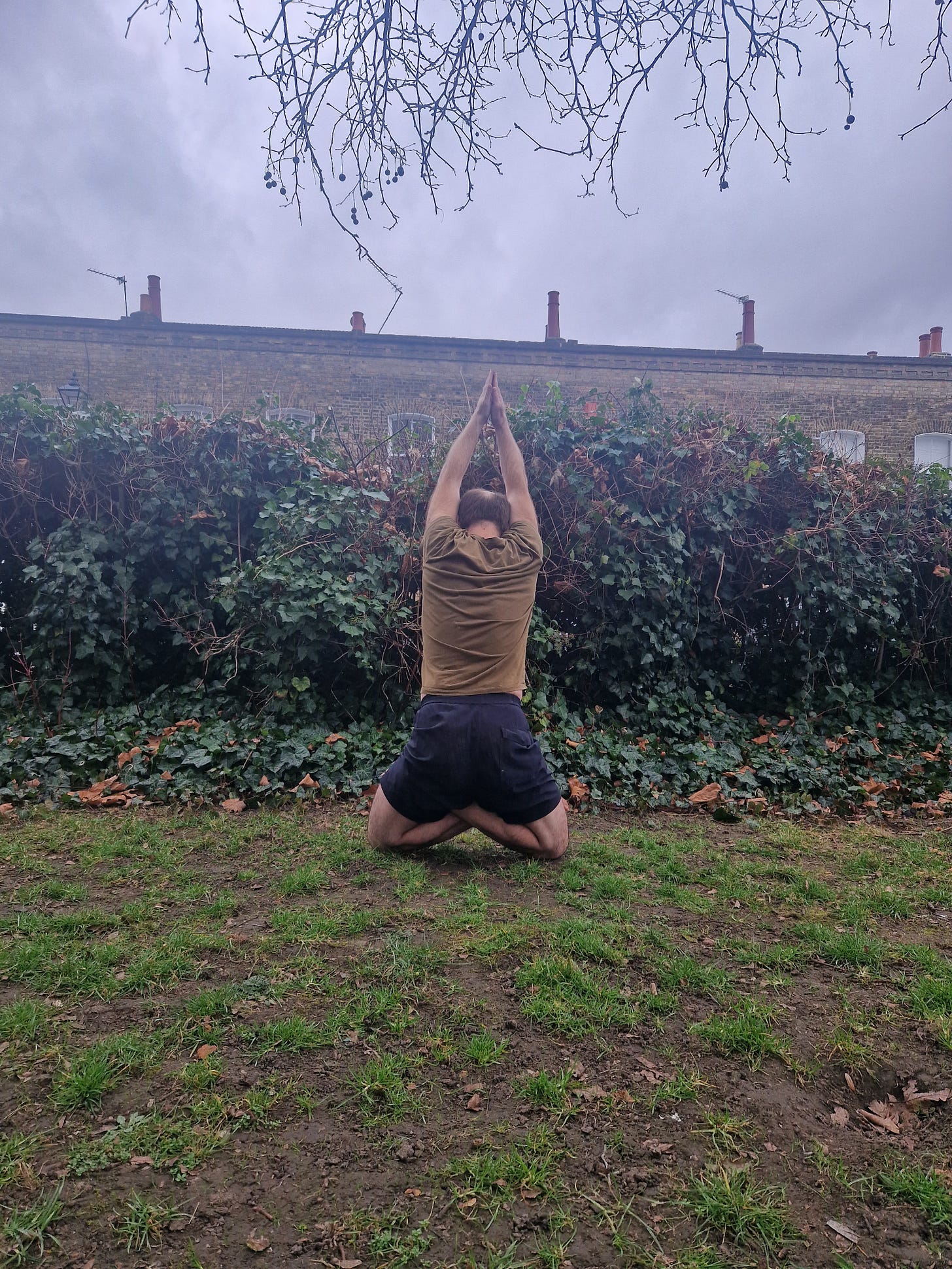Flow and Fight: A Yogi’s Battle with Insecurity and Instability
The Cost of Calm: When Yoga Meets Financial Reality
Photo by StreetLife Stories
When we feel safe, we feel happy; we flow through life. Our first chakra known as the root is based at the bottom of the spine close to the tailbone. Barbara Carrellas describes in Urban Tantra that “the first chakra is concerned with security and survival - the basic elements of life. On a personal level, the first chakra reflects issues of home, survival, and safety. On the community level, it is the ‘tribal’ chakra, concerned with issues of family, school, job, religion, nationality, politics, and patriotism. The first chakra is also concerned with money issues, insofar as money is connected to our survival, our safety, and our tribe(s). The first chakra grounds us like the roots of a tree: the stronger and deeper its roots, the more blossoms above”.
Perhaps wealth is why Bruce Wayne found it easier to tap into Batman?
There are assumptions that yoga teachers do well because…well, have you seen Instagram?! Grids posted of divine backdrops and poses that make you wonder about your next sex position. But for this Yogi, although flexible, he brings to light the contrast between what you see and what is real.
The Yogi's journey started as he consciously ended his 14-year relationship. As one door closes, another one opens or so they say…
The opportunity to start a new chapter of his story was all laid out, his mentor offered him a studio manger role and a permanent teaching spot in Denmark. However, due to laws limiting his stay in the Schengen zone to 90 days within any 190-day period and visa yet to be approved, he had to return to the UK earlier than expected.
“… it wasn't appropriate at that stage for me to go back to the house. So effectively the moment I come back to UK…at this point, I'm technically homeless, because I haven't got an abode”
The Yogi’s UK comeback was seen as somewhat of a holiday as it was only a waiting game for his visa to come through. Fortunately, during this time a friend offered a space.
“[This] meant that one person's goodwill stood between me and being fully homeless”
The space turned out to be the corner of a living room on a punctured air bed, as he said this he pointed to the size of my A4 notepad indicating the thickness. The friend would routinely work and chill in the front room until the early hours of the morning while The Yogi was in his corner hoping to get some sleep before sunrise, but what did It matter? It was a stopgap until a stamp was received but sadly, the visa was rejected and with no legal rights to his ex-partner’s home and no stable income bar a few London cover classes The Yogi was now a sofa surfer.
After some time The Yogi received an invitation to regularly teach 2 classes a week in Brighton. With this seaside town being the same travel time as it can take Zone 4 commuters into the City, it was The Yogi’s opportunity to network in his circle. However, with the cost of travel at times being quadruple the Zone 1 - 4 day rate, The Yogi saved on accommodation by sleeping on a yoga mat on the studio floor and was known to walk an hour at 3am after having to get a 2am coach when train prices were extortionate. Thankfully, the yoga mat has now been upgraded to a mattress.
With The Yogi continuing to put his name out there, he also managed to pick up some London reception shifts which were a source of guaranteed hourly income and with the flexibility of what this industry brings, Mr. Yogi could manage his schedule to still make guest appearances in Denmark and other European destinations.
“It is not uncommon for yoga teachers especially early in their career. You have the advantage that you can travel pretty much anywhere in the world. The type of yoga that I teach is mostly taught in English, certainly around Europe, and certain other parts of the world. So it's quite easy to travel teach but it is not glamorous, you know you will usually end up staying in studios and studios vary. The studio in Denmark, there was actually a room with a bed in it and a proper kitchen because it was a kitchen with a bed in the kitchen…so yeah I slept in the kitchen but when the studio was closed, that was my space. It was okay. Well, that meant I could cook food so that wasn't an issue to me. Because maybe they felt to me more like a studio flat. In fact, I think my first remarks when I walked in there were if this was a studio in London, this would cost me a hell of a lot of money that I couldn’t afford”
Once The Yogi was in a slightly better position, he upgraded to an unofficial room in East London. Although the room was a place to close the door and call his own, the place, unfortunately, had its downsides. It came with 6 unclean, untrained cats, a landlady who screamed to her friend on loudspeaker for a minimum of 2 hrs regularly and with 2 other individuals where being friends wasn’t an option so The Yogi found solace in his teaching schedule.
“I was incredibly grateful to have the room itself and really nice, actually a nice little space and to be able to go in somewhere close the door and just be in my own space was fantastic…Which again, you know, is definitely not as bad as living on the streets but it affected me more than I thought it would once I'd moved in. The cats were on the surfaces, it didn't feel clean. The atmosphere, the environment, although everybody in the house was a nice person, there was a lot of drama for a while because by this point, I had started working a lot of shifts, so I wasn't there much when I first moved in. It was like every shift [I worked] was a hidden holiday”
Although, he found means of escapism in his work and had a solid roof over his head, mentally he was struggling:
“you’ve got the anxiety that you might be living on the street at any time. So that’s always in your head, but it can be also quite exhausting mentally if I’m honest, a little bit demeaning to be constantly in a space that is other people’s space. It’s not your space”
‘Renting’ in this manner is all under the radar as The Yogi isn’t able to pay a deposit, no credit checks available and everyone is relying on reduced stickers, good will gestures and a miracle. For this landlady, The Yogi could have been her miracle but the opposite of this is the feeling of “being a dirty little secret”. I guess the thing they both had in common is being each other’s secret, always having to be hidden away, not sharing with anyone where you live or who with. All of this because the very people who would penalise us for helping someone get back on their feet as well as helping ourselves to survive and put money back into the economy are the very same people who tell us that COVID is a highly contagious disease and yet get caught in a passionate embrace (I wonder if he got intrigued by the Insta yoga hole?) while also having a group drinks soiree at our expense.
Maslow's Hierarchy of Needs states that individuals have physiological, safety, belonging, esteem, and self-actualisation needs that must be met in order to achieve optimal mental health and well-being. Housing, cost of living, safety, security, and finances play a crucial role in meeting the basic physiological and safety needs. A lack of adequate housing and financial stability can lead to increased levels of anxiety and stress, which can negatively impact a person's mental health. When it comes to the yoga industry, being paid insufficiently can also have a negative impact on one's financial stability and thus overall well-being.
The Yogi was able to provide me with a general idea of how pay structures work within the yoga sphere.
“Given the amount of people that are paying for yoga, you would probably expect that, you know, teachers living in the lap of luxury, it's not the case. There are different ways that the pay gets structured based on different studios”


Despite the rise in popularity, yoga teachers are not fairly compensated for their long hours of work, preparation, and dedication to their students. A typical rate for a newly qualified teacher for a 60-minute class could pay £28. However, a full class could lead to a higher pay rate. The competition among teachers and studio owners can lead to conflicts, especially if the teacher becomes too popular and attracts students away from other classes. Some studios use the Class Pass system to entice new turnover but if a student books in via Class Pass, teachers only receive around £1-2 per student. This pay structure can create competition among teachers, leading to stress and insecurity in their livelihoods. The complicated pay structure based on the number of students in a class also leads to uncertainty and added stress for teachers.
Why are we undervaluing a tradition of the ages that is proven to work for humankind on a mind body and soul level? If kids were taught meditation and yoga in schools, what would the next generation be like? Perhaps if we gave the same news time to the holistic and wellbeing scene, the economy might be in a more balanced place.
Having the choice of where you want to live and how is taken away from the majority of these individuals for them to give back a form of healing that has helped them to survive. Perhaps it is time for us to shift the focus from the hustler mentality to boost the economy and realise that a happy and healthy population is the foundational root of a thriving nation.
This is not just a story of a yogi trying to make it in the world of teaching - it is a story of countless individuals who are forced to sacrifice their time, energy, and financial stability to pursue their dreams. The impact of these struggles can be far-reaching, affecting mental health, relationships, and even leading to homelessness. It is a reminder that we must do better as a society to support those who are working hard to build a better life for themselves and their communities.
Still experiencing sofa surfing, The Yogi deeply resonates with the root chakra being on rocky ground. The Yogi has requested to stay anonymous for now but has plans to continue teaching in London, building his brand and venturing into various modalities to help individuals face themselves in the mirror, regardless of what their past or current situation is.


